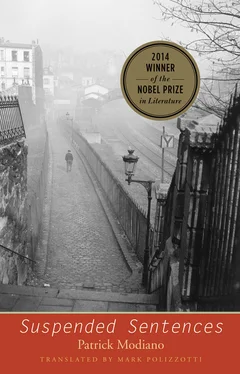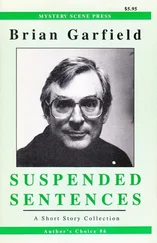Toward midafternoon, we followed the path leading away from the knoll and, along with Snow White, we penetrated into the forest. We walked all the way to the Food Hamlet. In autumn we’d gather chestnuts. The baker at the Hamlet was my schoolmate’s dad, and every time we went into his shop my friend’s sister was there, and I admired her wavy blond hair that fell to her ankles. And then we went back by the same path. In the twilight, the façade and two forward-projecting outbuildings of the chateau looked sinister and made our hearts pound, my brother’s and mine.
“Shall we go see the chateau?”
From then on, these were the words my father spoke at the end of every lunch. And just like the other Thursdays, we followed Rue du Docteur-Dordaine and slipped through the half-open gate into the field. Except that, on those days, my father and one of his friends — Badel, Gordine, Stioppa, or Robert Fly — came with us.
Snow White went to sit on the bench at the base of the pines, in her usual spot. My father approached the chateau, contemplating the façade and the tall, boarded-up windows. He pushed open the main door and we walked into a grand entrance hall, whose tiling was buried under rubble and dead leaves. At the back of the hall was an elevator cage.
“I used to know the owner of this chateau,” said my father.
He could see my brother and I were curious. So he told us the story of Eliot Salter, the marquis de Caussade, who, at the age of twenty, during the First World War, had been a flying ace. Then he’d married an Argentinian woman and become the king of Armagnac. Armagnac, said my father, was a liqueur that Salter, the marquis de Caussade, made and sold in very handsome bottles by the truckload. I helped him unload all those trucks, said my father. We counted the cases, one by one. He had bought this chateau. He had disappeared at the end of the last war with his wife, but he wasn’t dead and someday he’d be back.
Gingerly my father peeled off a small notice affixed to the inside of the front door and gave it to me. Even today, without the slightest hesitation, I can still recite what was written on it:
Seizure of illegal gains
Tuesday, July 23, at 2:00 p.m.
At the Food Hamlet
Magnificent property
including chateau and 750 acres of forestland
“Keep an eye on this place, boys,” said my father. “The marquis will be back, and sooner than you think …”
And before getting into the car of whatever friend was driving him that day, he bid us good-bye with a distracted hand, which we could still see waving limply through the window as the car headed off to Paris.
We had decided, my brother and I, to visit the chateau at night. We had to wait until everyone in the house was asleep. Mathilde’s room took up the ground floor of a tiny cottage at the back of the courtyard: no danger of her hearing us. Little Hélène’s room was upstairs in the house, at the other end of the hall, and Snow White’s was next to ours. The hall floor creaked a bit, but once we made it to the foot of the stairs we’d have nothing to fear and it would be clear sailing. We would pick a night when Annie wasn’t home, as she went to bed very late — a night when she was crying at Carroll’s.
We’d taken the flashlight from the kitchen cupboard, a silvery metal flashlight that produced a yellowish beam. And we got dressed. We left on our pajama tops under our sweaters. To keep awake, we talked about Eliot Salter, the marquis de Caussade. Taking turns, we came up with the wildest tales about him. On the nights when he visited the chateau, according to my brother, he arrived at the local station on the last train from Paris, the eleven-thirty-three, whose rhythmic rumbling we could hear from our bedroom window. He liked to avoid drawing attention to himself and so didn’t park his car in front of the chateau gate, which would have aroused suspicion. Instead, it was on foot, like a simple pedestrian, that he went to his property for the night.
We were both convinced of the same thing: on those nights, Eliot Salter, the marquis de Caussade, stayed in the great hall of the chateau. Before his arrival, someone had swept up the dead leaves and rubble, and afterward they would put it all back to cover every trace of his passage. And the person who made these preparations for his master’s visit was the gamekeeper. He lived in the forest, between the Food Hamlet and the edge of the Villacoublay airfield. We often met him during our walks with Snow White. We had asked the baker’s son for the name of this faithful servant who hid his secret so well: Grosclaude.
It was no coincidence that Grosclaude lived there. We had discovered, in that area of the forest that bordered the airfield, an abandoned landing strip with a large hangar. The marquis used that landing strip at night, to head off in an airplane toward some faraway destination — an island in the South Seas. After a while, he would return from there. And on those nights, Grosclaude would set out small light signals so the marquis could land more easily.
The marquis was sitting in a velvet armchair in front of the massive fireplace where Grosclaude had lit a fire. Behind him, the table was set: silver candelabras, lace, and crystal. We entered the great hall, my brother and I. The only light was from the fire in the fireplace and the flame of the candles. Grosclaude saw us first and came charging up to us, with his boots and riding breeches.
“What do you think you’re doing here?”
His voice was threatening. He’d surely give us both a couple of slaps and throw us out. It would be better if, when we entered the hall, we went straight up to the marquis de Caussade and talked to him directly. And we tried to plan in advance what we would say.
“We’ve come to see you because you’re a friend of my father’s.”
I would be the one to speak that first sentence. After that, in turn, we’d say:
“Good evening, my Lord.”
And I would add:
“We know that you’re the king of Armagnac.”
Still, there was one detail that worried me: the moment when the marquis Eliot Salter de Caussade turned his face toward us. My father had told us that his face had been burned during an aerial battle in the First World War, and that he concealed this burn by covering his skin with ochre-colored makeup. In that entrance hall, in the light of the candles and the wood fire, that face must have been terrifying. But at least I would finally see what I tried to see behind Annie’s smile and bright eyes: a hothead.
We had crept down the stairs on tiptoe, our shoes in our hands. The kitchen clock said eleven-twenty-five. We had gently closed the front door to the house and the small metal gate that opened onto Rue du Docteur-Dordaine. Sitting on the curb, we laced up our shoes. The rumble of the train was approaching. It would be in the station in a few minutes and would leave only a single passenger on the platform: Eliot Salter, the marquis de Caussade and the king of Armagnac.
We chose nights when the sky was clear, when the stars shone around a sliver of moon. Our shoes tied, the flashlight hidden between my sweater and my pajama top, we now had to walk to the chateau. The empty street in the moonlight, the silence, and the feeling that came over us of having left home for good gradually made us slow our steps. After about fifty yards, we turned back.
Now we unlaced our shoes and gently closed the front door to the house. The alarm clock in the kitchen said twenty minutes to midnight. I put the flashlight back in the cupboard and we tiptoed back up the stairs.
Huddled in our twin beds, we felt a certain relief. We spoke in low whispers about the marquis, and each of us came up with a new detail. It was past midnight, and over there, in the great hall, Grosclaude was serving him his supper. The next time, before turning back, we’d go a bit farther down Rue du Docteur-Dordaine than we had this time. We’d go as far as the convent. And the next time after that, even farther, up to the farm and the barbershop. And the time after that, farther still. A new milestone every night. Then there would only be a few dozen yards to go before we reached the chateau fence. The next time … We ended up falling asleep.
Читать дальше












